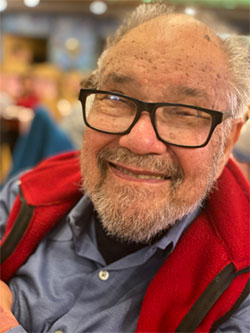
| Vol.
XXXII No.
3 January / February 2020 |
| contents |
| Printable Version |
In Memoriam
Aron Bernstein

It is with great sorrow that we acknowledge the passing of Professor Emeritus of Physics Aron Bernstein. A former member of the Faculty Newsletter Editorial Board, Aron was an MIT faculty member for 40 years, retiring in 2001. He passed away on January 14 at age 88 after a short battle with cancer.
Aron grew up in Brooklyn and Queens during the Depression and World War II. He had a special talent for mathematics and science and attended Queens College and Union College, receiving a bachelor’s degree in physics from Union in 1953. He received his PhD in physics from the University of Pennsylvania in 1958 and then went to Princeton as a postdoctoral associate. He joined the MIT faculty in 1961.
Aron was well known as an accomplished and broad nuclear scientist.
He performed experiments at a number of particle accelerators around the world, investigating nuclear structure and reactions with a variety of probes. While primarily an experimentalist, he also had deep knowledge of nuclear physics theory, which helped him to perform cutting-edge and important research. Aron mentored many young scientists who worked with him as students and postdocs. A number of them are now leaders in the field of nuclear science.
An early and lasting interest of Aron’s was the issue of nuclear weapons. He was particularly inspired by Victor Weisskopf, a member of the MIT faculty when Aron joined. Weisskopf, like other MIT physics faculty members, had been in Los Alamos during the war as part of the Manhattan Project. He and others worried about the threat to humankind from the proliferation of nuclear weapons and worked to try to contain the threat. Aron joined and continued this effort for much of his career. In 1969 he helped found the Union of Concerned Scientists, an organization that remains one of the key voices in nuclear arms control. Aron also was a longtime supporter and board member of the Council for a Livable World. The Council aims at electing candidates who are strongly committed to addressing the issues posed by the existence of nuclear weapons.
Recently, Aron led the establishment of the Nuclear Weapons Education Project (NWEP) at MIT. The goal of the NWEP is to make sure that younger generations are aware of the threat that nuclear weapons pose to humankind.
For people who grew up during the Cold War, the threat of nuclear weapons was in general all too real. For those who are younger this is no longer the case; indications are that many people have no idea how real and continuing the threat is. The NWEP is developing a large amount of relevant information and documents that are available broadly (to teachers and students especially) and that describe the realities of nuclear weapons and related threats. Aron’s leadership of the NWEP will certainly be missed, but the project will continue to pursue the goals he cared so much about.
Aron was clearly a remarkably accomplished and successful person. For those who knew him well, this is a very incomplete description. He was a special person who genuinely cared about humanity but who also cared deeply about his family, friends, and colleagues. One looked forward to seeing Aron in the beginning of the day and exchanging perspectives and feelings. He was so polite, thoughtful, and caring. He had a remarkable life and left a very positive legacy. He will be missed but he will also long be respected and admired.
| Back to top | |
| Send your comments |
| home this issue archives editorial board contact us faculty website |